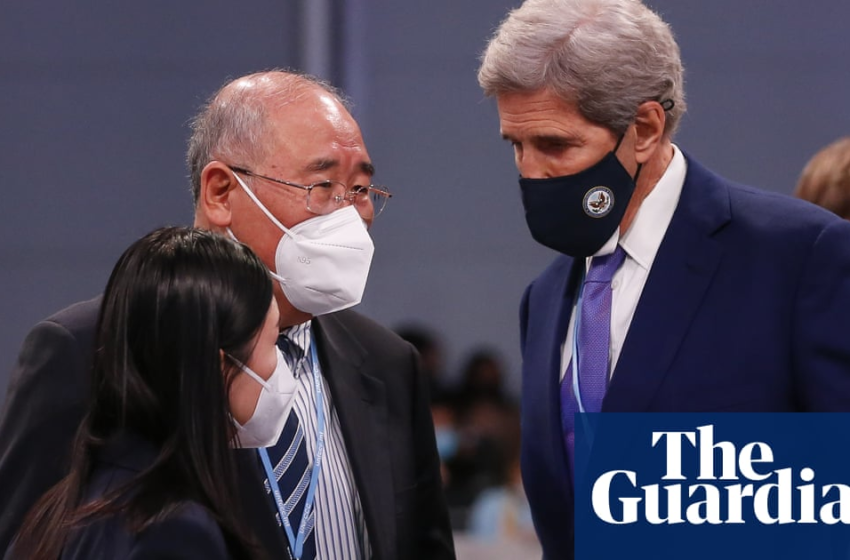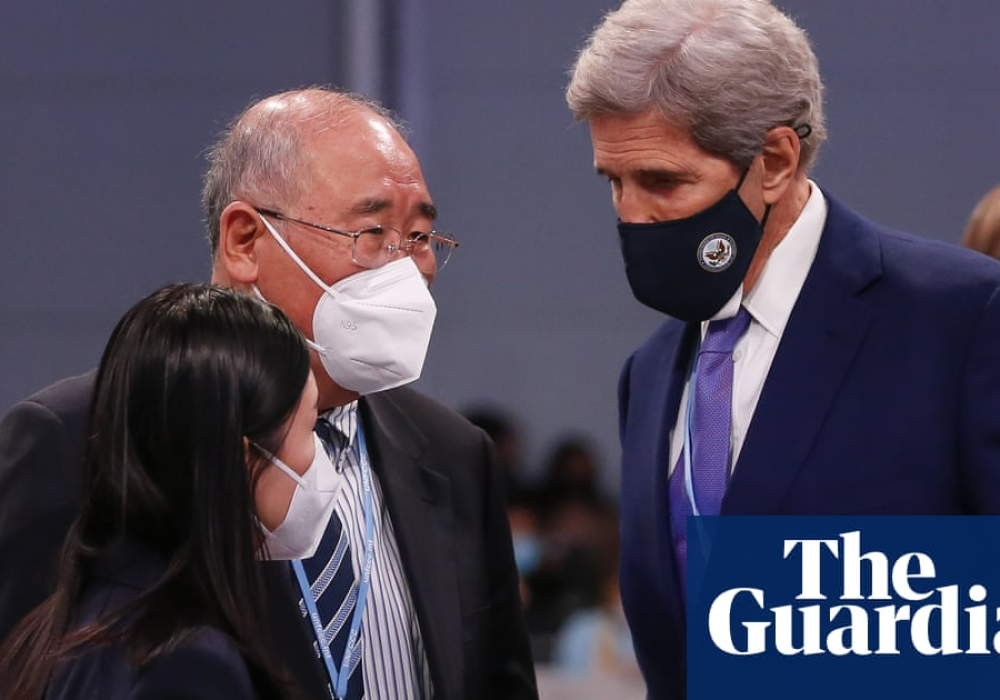US climate envoy says many countries have very aggressively increased their ambition
Sun 14 Nov 2021 11.06 GMT
The world is now closer than it has ever been to the goal of limiting temperature rises to 1.5C, the US climate envoy John Kerry has said, after the Cop26 negotiations ended in Glasgow with an “imperfect” but widely welcomed deal.
Kerry said: “We are in fact closer than we have ever been before to avoiding climate chaos and securing cleaner air, safer water and a healthier planet.”
But he warned that Cop26 was “not the finish line”, and was never going to be. Nations would still have much more work to do on their emissions-cutting goals to ensure the 1.5C limit was viable.
Kerry said: “Thanks to the work here in Glasgow, the goals we are setting ourselves are much, much closer. And we will come even closer if we implement and follow through [on the deal agreed] … As we leave Glasgow, our code word is going to be implementation, followup and follow-through.”
He said there had been “a very aggressive increasing of ambition” by many countries, in terms of cutting greenhouse gas emissions, but that much more needed to be done.
He quoted the International Energy Agency estimate that if all the current long-term commitments were fully followed through, the world would limit heating to 1.8C in the long term. But he stressed that there was a gap between those long-term ambitions and countries’ crucial short-term targets for 2030, which would result in heating of 2.4C, and so countries needed to do more.
At Glasgow, nearly 200 countries agreed to keep pursuing the goal of limiting temperatures to 1.5C above pre-industrial levels, as set out in the 2015 Paris climate agreement. But they recognised that the commitments made at the fortnight-long Cop26 were inadequate to the task, and resolved to return to the negotiating table next year.
Kerry said the US would not need to revise its national target of cutting emissions by 50% by 2030, as it was strong enough. He indicated that other countries would be pressed to revise theirs, however, which presages fraught negotiations over the coming year before the next Conference of the Parties meeting in Egypt in November 2022.
He pointed out that the US had rejoined the High Ambition Coalition of developed and developing countries, which Donald Trump had left. He said the deal reached in Glasgow showed the strength of the Paris agreement.
“Paris built the arena, Glasgow started the race and tonight the starting gun was fired,” he said shortly after the deal was reached after 10pm.
The tense final negotiations at Cop26 dragged on more than 24 hours past their deadline of 6pm on Friday, ending late on Saturday night after a marathon end session in which countries repeatedly formed “huddles” on the plenary floor to tease out details of the wording they would agree to.
Kerry was in the thick of many of these huddles, seen at various points in close conversation with his Chinese counterpart, Xie Zhenhua, the Cop president, Alok Sharma, the EU’s executive vice-president Frans Timmermans, and consulting with many developing country representatives.
Kerry praised the constructive discussions with many countries. He said the US supported demands from developing countries over “loss and damage”, meaning the destructive impacts of the climate crisis that are already being felt. However, he did not say how any funding might become available in future for such loss and damage.
The language in the final text on loss and damage was a disappointment to many developing countries, as it contained no mechanism for such funding.
There was also criticism from many observers of the talks for the final-hours watering down of commitments regarding the issue, although Sharma insisted in his post-plenary press conference that the very appearance of the concept in the final text for the first time in the history of climate negotiations since the Kyoto protocol was signed in 1997 was an indication of “a newly collegiate approach”.
The Ugandan campaigner Vanessa Nakate singled out the Scottish government for praise after it became the first developed country to pledge money to a loss and damage fund.
Responding to the final text on Saturday night, Scotland’s first minister, Nicola Sturgeon, said: “Over the course of Cop26, Scotland has put £2m on the table for loss and damage and, in doing so, we have become the first developed country to step up. Our action has already galvanised $3m of philanthropic funds to add to our contribution and a further €1m from Wallonia.”
She added: “Developed countries can no longer in good conscience ignore this pressing moral issue. The demand for financial support for loss and damage must be met.”
John Podesta, the former White House chief of staff, influential US political analyst and founder of the Centre for American Progress thinktank, said the US must “follow through” on its commitments through Biden’s domestic legislation, as well as through international diplomacy.
“If we [as a world] plan to meet the increasingly challenging goal of limiting global temperature rise to 1.5C and avert the most devastating impacts of climate change, we need to go further, faster,” he said. “The level of our ambition has to continue to move up. We must turn targets into concrete actions during this decade and double down on climate financing to help developing countries transition and adapt. The language on coal in the final text does not meet the accelerated pace of transition to clean energy that the world needs to address the climate crisis. We must work to phase coal out.”
He added: “The US must follow through on our commitment and pass the Build Back Better Act so we can tackle the climate crisis and build a just and equitable clean energy economy with good-paying union jobs for the American people.”
{{topLeft}}
{{bottomLeft}}
{{topRight}}
{{bottomRight}}
{{/ticker}}
{{heading}}
{{#paragraphs}}
{{.}}
{{/paragraphs}}{{highlightedText}}
{{#choiceCards}}{{/choiceCards}}










